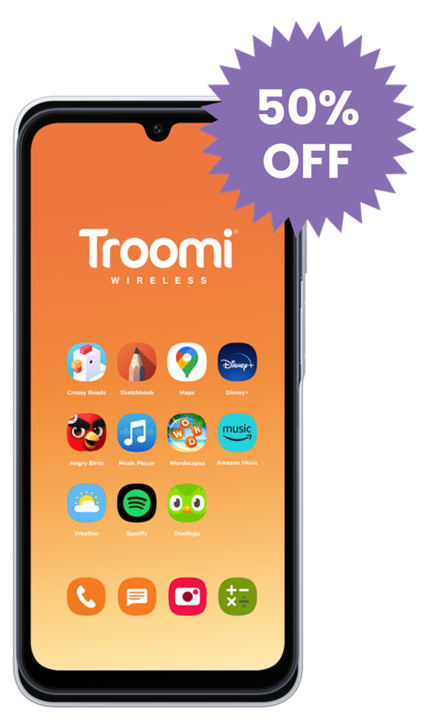Teaching first grade was the best job I’ve ever had. I loved working with my fellow teachers, and it was fulfilling to watch our students learn and grow as the year progressed. Unfortunately, teaching wasn’t all fun and games—especially when it came to discipline.
As parents and adults, it’s our job to help kids learn how to behave appropriately. This is where healthy discipline strategies come in. Studies report that teaching your kids to follow certain guidelines allows them “to develop self-discipline, and helps them become emotionally and socially mature adults.”
There are as many ways to teach your kids discipline as there are rocks in the mountains. Some parents teach their kids discipline by enforcing a curfew while others ask for extra help around the house. Other parents might discipline by taking away their child’s cell phone.
It’s no secret that kids spend a lot of time on their phone. In fact, the CDC reports that kids ages eight to 10 spend no less than six hours a day in front of a screen! With that statistic in mind, it makes sense that many parents would take away phone privileges as punishment. After all, taking away something that kids spend so much time on is sure to teach them discipline, right?
Unfortunately, this isn’t always true. Kids use phones for so much more than just communication. In some cases, punishing your child by taking away their cell phone can do more harm than good.
Should parents take away phones as punishment? Let’s take a quick peek at some pros and cons of taking your child’s phone away.
Pros and Cons of Taking Your Child’s Phone Away
At first glance, taking your child’s phone away may seem to be the perfect cure to bad behavior. Here are a few ways that taking your child’s phone away could be beneficial:
- Without a phone, kids have more time to reflect on their actions. Scrolling on a screen takes up a lot of time; time that kids could be using to look inwards and evaluate their actions. Relieving your child of their phone when they’ve done something wrong removes this distraction, giving them the time they need to consider what they did wrong.
- Kids get to practice their social skills. Some people argue that spoken communication is a lost art. I’m not sure if I agree, but relieving your child of their phone would give them extra opportunities to practice their social skills and connect with friends and family in-person.
- Kids sleep better without a phone to distract them. Phones are distracting and emit blue light, an artificial glare that messes with a child’s natural circadian rhythm. Taking away your child’s phone could help them sleep better, giving them the rest necessary to remain self-disciplined.
- Kids will be bored—and that’s a good thing! Every kid I know hates being bored. However, boredom can be good. When kids are bored, they’ll do anything in their power to overcome that boredom. Taking away your child’s phone will force them to find entertainment outside the screen, giving them a chance to utilize their problem-solving skills as they find new, creative ways to keep busy.
These sound like some pretty good benefits—and they are! Unplugging from technology gives kids time to slow down and focus on what really matters: family, friends, and fun.
However, forcing your child to unplug by taking away their phone likely won’t encourage the healing break from technology that we all need. Here are some reasons why taking away phones doesn’t work as well as you might think:
- You lose contact with your child. At their heart, smartphones help us communicate. Taking away your child’s phone makes it difficult to contact them. Without this line of communication, it’s hard to let your child know about sudden schedule changes or new plans. This also works the other way around: without a phone, your child is unable to call you in the case of an emergency.
- You won’t be able to track your child using GPS. Many smartphones, including those from Troomi Wireless, feature GPS functionality that parents can use to keep track of their child’s location. This function helps parents find lost or missing children, making it an extremely valuable tool in keeping kids safe.
- Kids may spend more time on other screens to compensate. Often, parents take away their child’s phone to decrease the time they spend staring at a screen. However, smartphones aren’t the only screen your child has access to. Taking away the phone could lead kids to fill their time with TV, video games, or YouTube videos on a computer or tablet.
- Smartphones are for more than just texting. Like most of us, kids use smartphones for more than just communicating. Your child’s smartphone is also their alarm, calculator, calendar, notebook, tape recorder, and music player. Taking their device away could inhibit their routine, taking away some of their independence in the process.
- Taking away privileges breeds resent rather than reformation. You might think that taking away your child’s phone will give them time to reflect and consider what they’ve done wrong. However, the Child Mind Institute reports that removing privileges actually causes teens to withdraw from their parents. Kids might even wonder, “Why do parents take away phones for no reason?” and resort to keeping important details about their life private for fear of losing privileges.
Alternatives to Taking Away the Phone
While there are some benefits to taking away your child’s phone, this form of discipline will likely create more problems than it solves. With that in mind, here are a few healthy, disciplinary alternatives that will help your child learn how to be self-disciplined and independent without making you the bad guy.
Have a conversation with your child about their behavior. Communication is key. When your child does something wrong, sit down with them and have a discussion about their actions. Help them understand that they did something wrong. Share with them how their actions made you feel. Through open communication, your child will learn that words often solve problems better than actions.
Let natural consequences play out. One of the best ways to teach kids and teens self-discipline is to let the natural consequences of their actions play out. If they missed dinner, for example, let them feed themselves. If they stayed out past curfew, they still have to get up bright and early the next morning for school. This teaches your child an important lesson about actions and consequences—and requires minimal disciplinary action on your part.
Give your child extra responsibility around the house. Not many kids love doing chores. Giving your child extra responsibilities around the house may teach them that bad behavior never pays. There are more benefits than just this, however: giving your kids chores teaches them responsibility and shows them that you trust their ability to accomplish a task successfully.
Praise your child’s positive behavior. Kids respond well to positive reinforcement. Instead of berating them for their bad behavior, try praising them for their good behavior! This shows them that acting kindly and correctly leads to positive consequences, just as doing something wrong leads to negative ones.
Limit functionality on your child’s phone. If you’re leaning towards taking away your child’s phone privileges, try limiting their phone’s functionality instead. Give them access to necessary functions like the alarm, calendar, and phone, but take away distracting apps like social media. You can accomplish this by going to the parental controls section on most phones. Troomi phones are no different: the Troomi Parent Portal gives you the power to determine what features your child can and can’t use on their device.
Focus on Being a Positive Parent
So should parents take away phones as punishment? Ultimately, that’s up to you.
Teaching your kids discipline is one of the most important parts of being a parent. It’s also one of the most difficult. When you’re forced to put on your disciplinarian shoes, it can be tempting to take away your child’s phone as a result of bad behavior. However, this method may not be productive.
Rather than take your child’s phone away, try some positive methods of discipline. Have a conversation with them. Let the consequences of their actions play out naturally. Keep an eye on them, and praise their positive behavior. You might be surprised at how much more effective these alternatives are.


